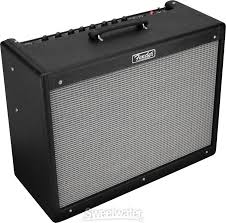My amp sounds amazing. Except when it doesn’t. Last night, no matter what I tried, I could not get a good crunch tone from my amp (Peavey Valveking II Micro.) Eventually I just turned it off and did something else. I’ve heard other players say the same thing, but the range of opinions is huge. Some say this never happens to them, some say it only happens with tube amps, some say it happens with any amp. And some say it’s totally psychological. What’s the truth?
The truth is that this is a very complicated topic because opinions about guitar tone are extremely subjective. But there are some actual facts related to the topic, so that’s what I base my opinion on. Here are the variables that impact your opinion of how your amp sounds:
- Temperature. It affects the sound waves coming from the speaker. Sound waves travel faster or slower depending on the temperature. However, you need a pretty big change in temperature to notice this. But there could be a tiny change to the sound of your amp based on temperature. One too small for you to hear.. Temperature can have an audible effect on the sound of an acoustic guitar, but on an electric guitar, the effect would be very difficult to notice. Temperature can impact how a tube performs, but it shouldn’t be noticeable if the day to day changes in the room are fairly small, like a few degrees. Temperature can have an effect on how your ears hear sound, but only in wider ranges.
- Humidity and Air Pressure. Both can impact sound waves. And like temperature, the difference is likely too small to hear. Humidity does, however, impact the sound of a speaker, which can absorb more or less moisture from the air. However, again, the change should be too small to notice. Air Pressure can affect how both strings and speakers vibrate, but the air pressure changes in your room would be too small to hear. Like temperature, humidity affects wood, and guitars are made of wood, so changes in humidity can affect the tone of a guitar. But most agree that this isn’t a significant issue with electric guitars.
- Electricity. The voltage coming into your amp can definitely impact the amp’s output. Most tone chasing touring guitarists put power conditioners on their amps to make sure the volts and amps are exactly what the amplifier needs. The voltage in your house can definitely vary from day to day. How big of an impact that has can depend on how big the variance is. If it’s small enough, you can’t hear it. If it’s bigger, your amp can sound more “sluggish” and have less “balls,” to use some technical terms. It’s unlikely this is an issue, but it could be.
- Tube Health. Tubes go bad. But they don’t drop dead in the space of a minute. They slowly burn out over time, so after a certain point your tubes will start to diminish in sound quality. However, you’ll normally hear some artifacts when this happens – you’ll hear a crackling noise, even when you’re not playing. You can tell the difference between this and any other factors by comparing the sound day to day. If you have a bad tube, the sound won’t get better.
- Your Brain. Mood can have an effect on how you feel about a sound – a bad mood can make things sound worse and a good mood does the opposite. How much ranges from person to person. But of everything on this list, your mood is the most likely factor, assuming your tubes and power are fine, which they probably are.
You might surmise that none of the items in this list are actually important except 4 and 5. You might think the other things aren’t factors. They might not be. But human hearing is actually pretty amazing in its abilities to notice things we might find impossible, especially when it comes to musicians and their sounds. Your brain is the most likely candidate for your amp sounding different sometimes, but we cannot disregard the other factors because “science” says they don’t matter. It’s like the whole “Does wood affect tone” argument – it’s based on science versus the amazingly complicated and perceptive human ear. Psychology plays the biggest role, but scientists don’t give the ear enough credit.
So what does that mean from a practical standpoint? It means be aware that it’s probably you, BUT probably is not definitely. If you live in an area where the weather changes radically over the year, you might consider a humidifier or dehumidifier for your music room. If your house and wiring are both really old, a power conditioner might be a good idea. Hell, a power conditioner is likely a good idea for everyone because it can’t hurt, and it offers another layer of surge protection. Tubes will usually last somewhere between 500 and 1,000 hours. If you average 3 or more hours a day, you might replace your tubes yearly, but most players can get away with far longer. If you hear a “crackling” sound, it’s likely your preamp tubes, and you should replace them.
So yes, your amp CAN sound different to you from day to day. It’s mostly in your head, but there can be other factors.




